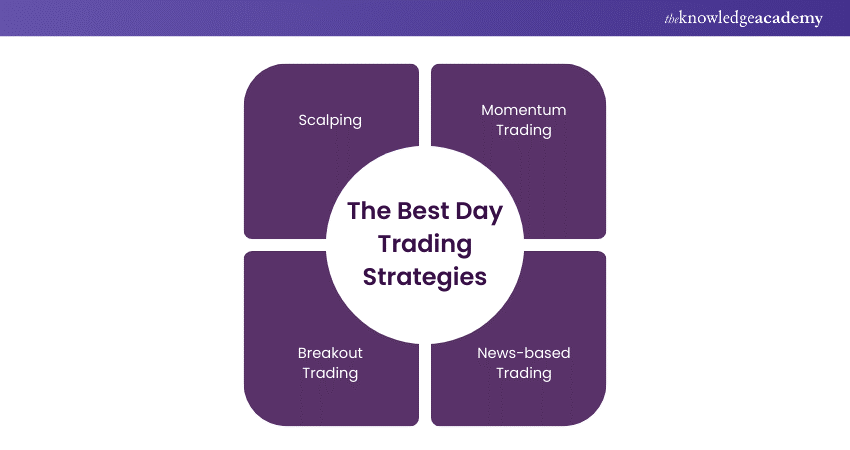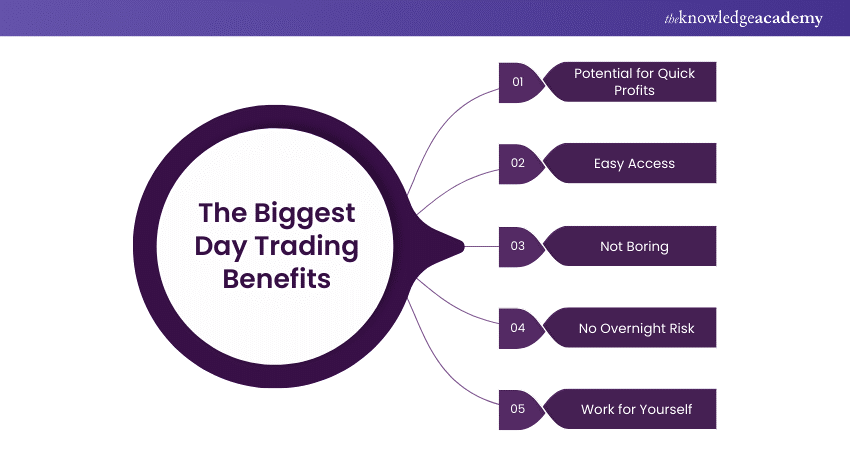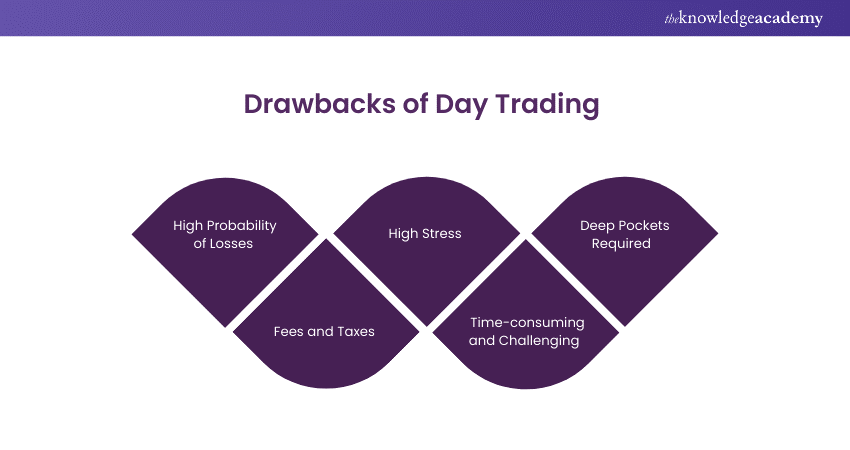We may not have the course you’re looking for. If you enquire or give us a call on +918037244591 and speak to our training experts, we may still be able to help with your training requirements.
We ensure quality, budget-alignment, and timely delivery by our expert instructors.

Day trading brings an added sense of exhilaration to the tense world of stock trading. It involves buying and selling financial instruments within the short span of a day. It’s a high-speed rollercoaster where you must strap in for lightning-quick moves while tracking price fluctuations, market trends and narrow time horizons. This blog dives deep into the thrilling world of day trading and will help you understand the commitment and skill needed to succeed in this dizzying fast-paced world.
Table of Contents
1) What is Day Trading?
2) How to Start Day Trading?
3) Strategies for Day trading
4) Benefits of Day trading
5) Drawbacks of Day Trading
6) Example of Day Trading
7) Is Day Trading Suitable for You?
8) Conclusion
What is Day Trading?
Day trading is a trading strategy where individuals buy and sell financial instruments within the same trading day. This approach focuses on leveraging small price fluctuations in stocks, currencies, or other assets to generate quick profits. Traders often compare strategies like Margin Trading vs Short Selling to amplify their returns, each having unique risks and benefits for day traders looking to capitalize on market movements. Key aspects of day trading include
Short-Term Trades
Day traders open and close positions within the same trading day, avoiding overnight market risks.
Technical Analysis
They rely heavily on technical analysis, chart patterns, and real-time market data to make swift and informed decisions.
Leverage
Use of leverage to maximize potential returns, which also increases risk.
Day trading demands a significant time commitment and a thorough understanding of market mechanics.
While the potential for profit in day trading is substantial, the associated risks are also high, making it suitable for those with a high-risk tolerance and a comprehensive understanding of market dynamics.
How to Start Day Trading?
Professional day traders are distinguished by their extensive market knowledge, established presence, and ability to earn a living through trading. You can reach this level by following these steps and utilizing the right Day Trading Platform to help you make informed decisions and execute trades efficiently.
Acquire Extensive Market Knowledge and Experience
To thrive in Day Trading, you need to know the market like the back of your hand. Here’s your roadmap
a) Chart Reading: Think of charts as treasure maps. Learn to decode candlestick patterns, moving averages, and other technical indicators. They reveal hidden clues about price movements.
b) Market Fundamentals: Understand the market’s heartbeat. What drives prices? How do news events impact stocks? Dive into the ins and outs—the devil is in the details.
Ensure You Have Adequate Capital
Think of capital as your trading fuel. Here’s why it matters:
a) Risk Capital
Only use money you can afford to lose. Day trading isn’t a game of Monopoly; real cash is at stake. Keep emotions in check by risking what won’t break your bank.
b) Intra-Day Moves
Day traders thrive on tiny price fluctuations. Picture this: You’re chasing pennies or fractions of a cent. To catch those moves, you need enough capital to play the game.
c) Margin Accounts
If you’re into leverage (like a financial acrobat), ensure your margin account has a safety net. Volatile swings can trigger margin calls faster than a race car hitting the brakes.
Learn Trading Discipline
Success in day trading hinges on discipline—sticking to your game plan even when emotions run high. Here’s how day traders navigate this world
Market Volatility
Day traders thrive on market volatility. Think of it as their adrenaline rush. They’re like surfers waiting for the perfect wave. When a stock shows significant movement during the day, day traders notice. What causes this movement? It could be investor sentiments, earnings reports, or broader economic news. Volatility creates opportunities, and day traders pounce on them.
Highly Liquid Stocks
Liquidity matters. Highly liquid stocks are like well-paved roads—they allow traders to change lanes without causing traffic jams. Here’s why they’re desirable:
a) Buy and Sell Flexibility: Day traders can take a buy position if a stock price moves higher. If it goes down, they may decide to sell short. Liquidity ensures they can enter and exit positions smoothly.
b) Profit from Price Movements: When a stock moves, day traders want to profit from those fluctuations. Liquid stocks make it easier to execute trades without disrupting the market.
Remember, day trading demands a delicate balance of knowledge, risk, and capital.
Strategies for Day trading
Strategies are the moves you make on the financial floor, and here are the key ones

Scalping
Imagine snatching tiny profits like a nimble pickpocket. Scalpers jump in and out of trades within seconds or minutes. Their goal? Capture small price movements. It’s intense, like salsa dancing in a crowded room.
Momentum Trading
Momentum traders follow trends and the 'bigger, the better' philosophy. When stocks surge, they hop on, hoping the momentum will carry them to profit.
Breakout Trading
Think of Breakout traders as surfers who wait for that perfect wave of stocks to build up in the financial ocean. They ride the moment a stock breaks through a resistance level.
News-based trading
News trading isn’t just about reading headlines; it’s about predicting market moves. Seasoned day traders decode news events such as
a) Macroeconomic Events
Federal Reserve announcing changes in interest rates.
b) Company Gossip
Think of news affecting specific companies. Traders lean in and speculate on mergers, acquisitions, and corporate drama.
Remember, each strategy has its beat. Find your rhythm and practice it.
Benefits of Day trading
Day trading offers countless benefits, making it one of the most viable forms of investment. Consider this list of many of its upsides

Potential for Quick Profits
As a day trader, every decision you make is like a roll of the dice. If your trades go well, you can rake in fast profits. Just remember, it’s also about risk management and keeping your emotions in check.
Easy Access
Gone are the days of shouting orders on a crowded trading floor. Modern brokerage platforms let you day trade from the comfort of your home office. Set up your trading station, fire up your laptop, and get going!
Not Boring
Unlike usual boring buy-and-hold strategies, day trading is like a rollercoaster ride through the stock market. You’ll research, analyze, and pounce on opportunities as fast as possible. It's clearly more impressive to double your money in a single day as opposed to accomplishing the same in 2 years.
No Overnight Risk
While regular investors toss and turn, day traders sleep soundly. That's because they close out all their positions before the market closes. Day traders dodge that risk, while regular investors fear losing money if something happens overnight when they aren’t available to perform the trade.
Work for Yourself
Imagine being your own boss, setting your own hours, and answering only to your trading instincts. Some pros make a living from day trading, turning their passion into a full-time gig. Just remember, it takes discipline, strategy, and nerves of steel.
Drawbacks of Day Trading
While the probability of fast short-term returns is high in day trading, as discussed in analyses of the Pros And Cons of Day Trading, the risks are extremely high as well. Here are some of the downsides to this form of investment.

High Probability of Losses
Day trading is like betting on stocks. If your decisions go south, your account balance can nosedive quicker than regular investors.
Fees and Taxes
Although trading costs have decreased over time, fees are still associated with specific trades, particularly at high volumes. Additionally, day traders face higher taxes compared to regular investors. If you sell an investment that you’ve owned for less than a year, you’ll be subject to a higher tax rate for short-term capital gains, as opposed to the long-term capital gains rate.
High Stress
Markets move fast, and seeing your balance swing up and down can be stressful (especially if your trades aren’t working out). Worst case scenario, day trading can become an addiction, straining your health and relationships.
Time-Consuming and Challenging
Day trading isn’t a part-time gig; it’s a full-time commitment. Not only do day traders spend hours tracking and making trades, but they also need to research the market and strategies. It’s an enormous challenge to make money while competing with other investors, including seasoned professionals who work for major financial institutions.
Deep Pockets Required
Financial regulators demand that you keep 19,690£ in your brokerage account if you want to day trade. You will need even more to buffer against losses and have money ready for trades.
Example of Day Trading
The only difference between a day trade and other forms of stock trade is that both purchase and sale of a stock occur within the same day. It can even occur within seconds of each other.
Let’s consider an example: A day trader has completed a technical analysis of a company This analysis indicates that this stock (Listed in the Nasdaq 100) shows a pattern of price rise by at least 0.6% on majority of the days when the Nasdaq is up by more than 0.4%. The trader has reason to believe that this is his chance to make some quick profit.
a) The trader buys 1,000 shares of the company when the market opens
b) Then the trader waits until the company reaches a particular price point, probably up 0.6%.
c) The trader then immediately sells the entire holding in the company.
This is a day trade. Please remember that the merits of this specific company as an investment have little to do with the day trader's actions. It’s simply a case of a trend being exploited, as highlighted in many Day Trading Books that explain how traders capitalize on short-term market movements.
In case the company had bucked the trend and lost say 0.8%, the trader would have sold anyway and taken the loss.
Is Day Trading Suitable for You?
Day trading is a wild ride, and many novice traders bow out early. Even if you think you’ve got the skills and the back-up resources to outsmart the pros, remember – the odds are steep.
Considering the high stakes, it’s crucial to tread carefully when deciding if this is your path. Every trader begins somewhere, and as a beginner, you’ll face a steep learning curve.
Take the time to research and understand the financial markets and craft a suitable strategy before investing your hard-earned money.
Unlock the Future of Finance! Enroll in Cryptocurrency Trading Certification Today and Master the Skills to Profit in the Digital Currency Market!
Conclusion
Day trading offers a thrilling blend of significant risks and potential high profits. To increase your chances of success, it's important to know the Best Indicators for Day Trading that can help you make informed decisions. This blog aims to guide you through weighing your options as you embark on your journey towards becoming a successful day trader. Whether you're enticed by the fast-paced action, the possibility of substantial gains, or exploring opportunities like Day Trading ETFs, it's essential to be armed with caution and knowledge. We hope this blog helps you make informed decisions and prepares you for the challenges ahead.
Want to up your investment game? Investment management will guide you
Frequently Asked Questions
How much does a day trader make?

The estimated total pay for a Day Trader is £73,977 per year. The average salary is £52,507 per year.
How many hours a day is day trading?

Most independent day traders have short days and work two to five hours per day. They will often practice making simulated trades for several months before starting to make live trades.
Can I buy a stock and sell it the next day?

Yes, you can definitely buy a stock and sell it the next day. If you purchase stocks after hours, you can legally sell them in the morning the next day. But remember, in a regular brokerage account, you can’t execute more than three-day trades within five business days.
What are the Other Resources and Offers provided by The Knowledge Academy?

The Knowledge Academy takes global learning to new heights, offering over 3,000 online courses across 490+ locations in 190+ countries. This expansive reach ensures accessibility and convenience for learners worldwide.
Alongside our diverse Online Course Catalogue, encompassing 19 major categories, we go the extra mile by providing a plethora of free educational Online Resources like News updates, Blogs, videos, webinars, and interview questions. Tailoring learning experiences further, professionals can maximise value with customisable Course Bundles of TKA.
What is The Knowledge Pass, and How Does it Work?

The Knowledge Academy’s Knowledge Pass, a prepaid voucher, adds another layer of flexibility, allowing course bookings over a 12-month period. Join us on a journey where education knows no bounds.
What are the Related Courses and Blogs Provided by The Knowledge Academy?

The Knowledge Academy offers Day Trading course alongside stock trading. These courses cater to different skill levels, providing comprehensive insights into Investment Management.
Our investment training blogs cover a range of topics related to Investment and trading, offering valuable resources, best practices, and industry insights. Whether you are a beginner or looking to advance your trading skills, The Knowledge Academy's diverse courses and informative blogs have got you covered.
Upcoming Business Skills Resources Batches & Dates
Date
 Day Trading Course
Day Trading Course
Fri 25th Apr 2025
Fri 20th Jun 2025
Fri 22nd Aug 2025
Fri 17th Oct 2025
Fri 19th Dec 2025






 Top Rated Course
Top Rated Course



 If you wish to make any changes to your course, please
If you wish to make any changes to your course, please


